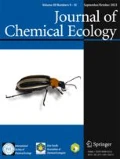The impetus for a special issue on Human Impact and Chemical Ecology originated from a talk by David Wood at the 25th Anniversary Meeting of the International Society of Chemical Ecology held at Pennsylvania State University in 2008. In Professor Wood’s historical review of the field of chemical ecology, he touched on many themes. They included reminders that: we would celebrate the 50th anniversary (in 2009) of the discovery of the first insect pheromone (the silk moth) by Butenandt and colleagues and the first use of the term “pheromone” by Karlson and Lüscher in the same year; the Journal of Chemical Ecology would celebrate its 35th Anniversary in 2010; from its origins in insect semiochemicals, Chemical Ecology has advanced into new frontiers as exemplified by previous specialized issues of the Journal devoted to such topics as Allelopathy (2000), Aquatic Chemical Ecology (2002), Molecular Chemical Ecology (2004), Mammalian Chemical Ecology (2006), and Olfactory Ecology (2008); and finally and importantly that the discoveries made under the broad umbrella of Chemical Ecology must continue to serve and benefit human survival.
Via an exchange of cocktail napkins during and after David’s address, Wilhelm Boland and I came up with a working list identifying current topics of focus in Chemical Ecology that directly impact human well-being and survival. The subsequently seven solicited review papers gathered here cover a broad spectrum of topics that range from the challenges of global change, invasive species, and pollution, to disease vectors. Among the four selected contributed papers are two that relate to plant chemistry (global change and invasives), one to pheromone disruption, and one to the protective aspects of geophagy.
We could not address all aspects of human impact within our various sub-disciplines. Many facets that likely deserve review, but are missing, include obvious ones: benthic and pelagic effects in aquatic systems, such as coral reef deterioration and red tides; diminishing populations of beneficial insects, such as honey bees; and accelerated geographic speciation and extinctions.
Notwithstanding, the topics included here ought to give one pause to reflect on: our collective global concerns and challenges; the achieved modest successes in combating many of our self-created problems; and the hope that the future will be better for our efforts. We express our thanks both to the authors of the invited review articles, all of whom claimed it to be a difficult but rewarding task, as well as to the authors of the contributed papers. We hope that readers of the Journal will find the issue enlightening, and provoking, and that perhaps it may serve to focus future research.
John T. Romeo
Editor, JCE
Rights and permissions
About this article
Cite this article
Preface. J Chem Ecol 36, 1 (2010). https://doi.org/10.1007/s10886-010-9742-1
Published:
Issue Date:
DOI: https://doi.org/10.1007/s10886-010-9742-1

